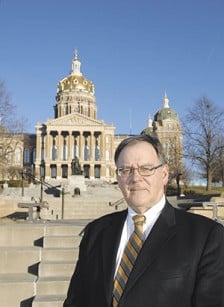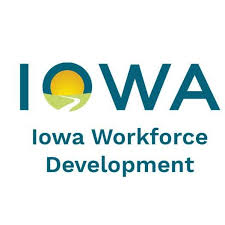4 issues to watch…
in the 2012 Iowa legislative season

1. Commercial Property Taxes
The issue: Governor, lawmakers and businesses want a tax cut
Tom Sands, a community banker from Columbus Junction, cut directly to what he calls the “big, heavy” stuff when he called the Iowa House of Representatives Ways and Means Committee to order.
For decades, Iowa legislators have kicked around the notion of cutting commercial property taxes. This could be the year they get something done, Sands and Statehouse observers say.
The only item on the committee’s agenda, aside from warm and fuzzy welcoming remarks, was House Study Bill 500, a three-headed beast that proposes a 40 percent exemption on all commercial and industrial property phased in over 14 years, attempts to limit local government spending and increases the amount of state funding to schools.
Another “heavy” piece of legislation could be introduced in Sands’ committee next week. It would let current tax increment financing (TIF) deals expire and rewrite the rules for future deals, all with the aim of lessening the impact of a reduction in property taxes paid by businesses.
Cutting commercial and industrial property taxes ranks at or near the top of legislative wish lists that have been released in recent months by trade groups that represent Greater Des Moines businesses.
They say the current system, in which business property is taxed at 100 percent of its assessed value, is a drag on economic growth and job creation.
“I think both parties are dedicated to getting something done,” said attorney James Carney, whose Carney & Appleby PLC lobbies on behalf of nearly 40 businesses and trade groups, including the Iowa Commercial Real Estate Association.
Gov. Terry Branstad has set his sights on a 40 percent reduction in the taxes over eight years. The House study bill takes a less drastic approach, and the Iowa Senate approved legislation last year that would exempt the first $30,000 of assessed value. The bill was supported by both parties in the Senate.
Senate Majority Leader Michael Gronstal indicated in his remarks to open the session that he remains pleased with the Senate bill as a way to help small and medium-sized businesses.
Democratic and Republican senators “put aside partisan bickering when we voted to cut property taxes in half for four out of five businesses,” he said. “It is the only proposal that does not simply shift more of the cost of local schools and local services onto the backs of homeowners and farmers.
“Most importantly, the Senate’s property tax cut focuses the help on the people who need it, Iowa’s small and Main Street businesses. That’s why it passed the Senate on an overwhelmingly bipartisan vote of 46 to 4.”
However, Republican Sands and Democratic Sen. Joe Bolkcom, who heads the Senate Ways and Means Committee, met privately prior to the start of the current session in attempt to find common ground, and chaired a meeting in Iowa City that focused on TIFs.
The property tax issue is complicated by the fact that politicians are reluctant to recoup lost commercial revenues from owners of residential properties, who pay taxes on a portion of their assessed value; that portion, or rollback, is steadily increasing from less than half to slightly more than 50 percent of a property’s assessed value.
“What we’re really trying to do is bring fairness and equity back into the property tax formula,” Sands said. Bolkcom could not be reached for comment.
The problem is how to reduce commercial property taxes without a subsequent increase in residential taxes.
“I think everyone recognizes that we do have high commercial property taxes,” Carney said. “The challenge is how do we reduce commercial property taxes and not adversely impact other groups. Do you want to increase taxes on homes? That affects almost everyone. If you lower commercial taxes and raise residential, from a political standpoint you’ve stuck a stick in the beehive.”
If that’s the case, the bees probably won’t be buzzing beyond the 100 days allotted for the session. In their opening speeches when the Legislature convened on Monday, leaders of both parties indicated that they want to get their business done and get out of town.
For one thing, lawmakers lose their daily expenses on April 17. In addition, this is an election year that will pit incumbents against incumbents in some races as the result of redistricting. “People seem to be serious not to spend six months here,” Sands said in his opening remarks to the Ways and Means Committee.

The issue: Proposed changes to TIF rules likely to be introduced
Tax increment financing, a chief economic development tool for Iowa communities, could be in for some changes.
Some lawmakers, with the support of some business groups, want to make changes to laws governing tax increment financing (TIF), in which potential taxes on the value of improvements to a property are deferred and used instead to pay some of the costs of development over a set number of years.
The Iowa Bankers Association is among the organizations that are pressing for changes in the collection of commercial property taxes, and it is keeping a keen eye on negotiations that could result in a different method of creating TIF districts.
“Bankers are always big supporters of TIF, but in some areas we need changes,” said Sharon Presnall, senior vice president of government relations and compliance for the bankers association. “We think TIF is a good local economic development tool in communities who use it right. … We need reasonable reform; we don’t want to lose that tool; it is important to communities and banks.”
One area of concern is that the financing method is used to support nonprofit organizations, which do not pay property taxes, said Rep. Tom Sands, chairman of the Iowa House Ways and Means Committee, where proposed changes to TIF rules are likely to be introduced next week.
A possible change in the laws would be to require neighboring taxing authorities, such as school districts, to approve the creation of TIF districts, Presnall said.
“People do recognize it as a nice economic development tool, so they don’t want to hobble it too much, but at this point, if they don’t do something, it’s going to happen one way or another,” Presnall said.
3 Trust in Trusts
The Issue: Millions in lost potential business fuels look at locking up land forever
The Iowa Bankers Association wants lawmakers to revise laws governing trusts to recoup business lost to other states.
The association, along with the Iowa Trust Association, is leading the charge to change a rule that was established by courts in the 17th century in an effort to prevent people from locking up land forever. It is called a rule against perpetuity, and in Iowa, the bankers groups says, it is costing millions in lost business for banks and others who manage trusts.
The statute prevents a trust from lasting longer than the remaining life of the person who creates it, plus 21 years.
It is “becoming a serious detriment to economic development in Iowa” because trust business has moved to states that abandoned or modified their rules against perpetuity statutes, according to the bankers association.
After changing its law, South Dakota’s trust business grew from five chartered trust companies with less than $1 billion in assets in 1996 to 50 trust companies with more than $60 billion in assets in 2010.
Sharon Presnall, senior vice president of government relations and compliance for the bankers association, said lawmakers attempted to change Iowa law in 2003, but the bill was vetoed by then-Gov. Tom Vilsack.
A major benefit of changing the rule is that multiple generations can retain assets in a trust and avoid paying an estate tax each generation. Without the rule, those assets are subject to federal estate tax at a rate as high as 45 to 55 percent.
If the law is changed, real estate could be sold after a fixed number of years, preventing it from being held forever, Presnall said.

The Issue: Transportation leaders seek gas tax increase to fund critical infrastructure
The Iowa Department of Transportation has identified a critical funding shortfall of $215 million per year for the next 20 years.
But, a bipartisan proposal released by two state legislators last week calls for a phased-in 8 cent per gallon increase in the state fuel tax by 2014, which, combined with a few other funding elements, could bring the state an additional $220 million per year in road funding. Advocates say the increase is a long time coming and represents the most feasible way to keep up with critical needs for the state’s infrastructure.











